InCHIP's Community Engagement Research Core's latest networking event offers insights for successful community research partnerships
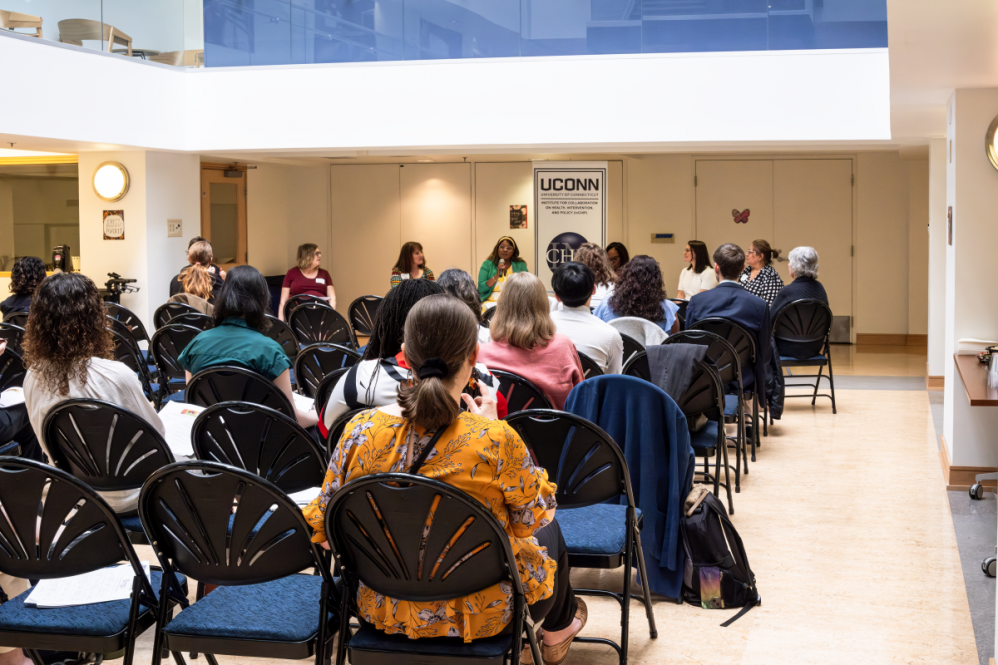
(UConn Photo/Danielle Faipler)
Community research can improve health outcomes and advance science, but it takes work to build trust, streamline administrative processes, align priorities, and build partnership equity.
On May 30, UConn faculty researchers and community partners gathered at the UConn Library in downtown Hartford for a panel discussion and afternoon of networking. UConn's Institute for Collaboration on Health, Intervention, and Policy's (InCHIP) Community Engagement Core and Office of the Provost's Office of Outreach and Engagement organized the event to provide attendees a space to connect, explore potential research collaborations, and learn more about community needs.
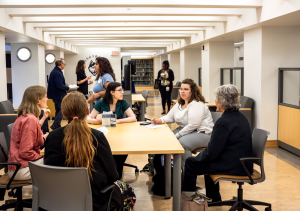
InCHIP's Community Engagement Core was originally established in 2017 to facilitate community research partnerships to promote innovative solutions to pressing health challenges affecting Connecticut communities. Kim Gans, professor in the Department of Human Development and Family Sciences, and Kristen Cooksey Stowers, assistant professor in the Department of Allied Health Sciences, co-chair the core's steering committee.
"This gathering was an opportunity for community organizations and UConn researchers to reconnect, explore collaborations for community-engaged research, and discuss ways that InCHIP and academic research partnerships can better serve communities," says InCHIP Associate Director Caitlin Caspi.
The panel discussion focused on strengthening community research partnerships. The panelists included: Cooksey Stowers; Beth Russell, associate professor in the Department of Human Development and Family Sciences, and co-Director of the Collaboratory for School and Child Health; Linda K. Barry, professor in the Department of Surgery and Department of Public Health Sciences at UConn Health, and associate director at the UConn Health Disparities Institute; Brittney Cavaliere, senior director of strategy at Connecticut Foodshare; and Sofia Segura-Perez, chief program officer at the Hispanic Health Council.
Each panelist has extensive experience in community-engaged research.
Community-engaged research refers to a collaborative approach in which researchers and community stakeholders work as equal partners to develop solutions to complex challenges. This paradigm can deepen existing connections and create new partnerships that produce meaningful, culturally appropriate interventions to improve health outcomes.
Building Relationships Through Trust and Respect
Traditional, top-down approaches to research have not always considered a community's needs in research design or shared findings with the community.

"Some communities may feel that previous research collaborators treated their needs as an afterthought, and they're distrustful of the ivory tower. In working with communities, it's important to engage the community as a real partner, and that if you can make them a co-principal investigator on a grant, it shows respect and can translate to a longitudinal partnership," said Barry.
Barry also emphasized the importance of maintaining connections after a grant ends.
"Sometimes I think researchers should be creating relationships just because. Not for now, but for later. And then, when you have a partnership, don't let it go after the grant ends. Show that you're invested in the organization's long-term success, because they often feel like they're not recognized as bringing something valuable to the table," said Barry.
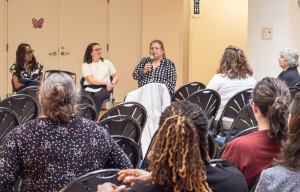
For Segura-Perez, listening to community partners and being flexible can foster the respect and trust that are vital to sustaining research partnerships.
"Starting a strong partnership with the community in the beginning is very important and shows respect for that community. Community partners can provide insights into more effective ways to engage with a community. Both researchers and community partners should have frank conversations about their expectations, be flexible and listen to one another," said Segura-Perez.
Clear Communication Sustains Relationships
Russell, who also directs the Center for Applied Research in Human Development, emphasized the value of clear communication.
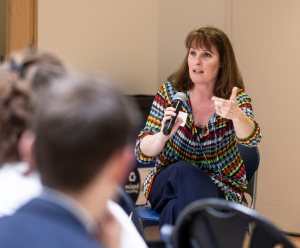
"Being honest about timelines and boundaries will help researchers and partners navigate barriers that come up and can help achieve multiple goals. Sustaining community partnerships relies on very honest communication," said Russell.
Open communication can also help resolve conflicts, allowing research to progress.
"There can be unnecessary red tape that makes day-to-day work tough. Small decisions can have big impacts when it comes to doing community research," says Cooksey Stowers. "My lab has been advocating for citizen research, and it can be difficult making sure community partners have everything they need to do their work. When roadblocks happen, we approach them with grace and patience."
Her team partnered with Connecticut Foodshare to better understand residents' experience of food insecurity and food assistance usage, ensuring data collection methods inform programs and services that expand food access.
"Everyone on my team has a master's in public health, and we can design a program evaluation and carry it out, but at the end of the day, we are not researchers, and we needed support to conduct a statewide survey," said Cavaliere. "We wanted to ensure the survey responses were representative of neighbors visiting food pantries across the state, and partnering with Kristen's team is helping us reach that goal."
Putting Lessons into Practice
These points resonated with attendees.
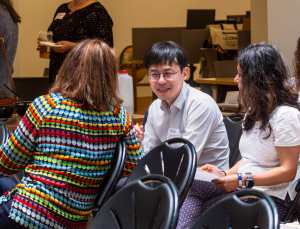
"People have research needs, but a community organization's goals may differ from their research partners' goals. It's important to understand what your partners' goals are so you can use your data to improve services or infrastructure. Without these kinds of conversations, those goals may not be achieved," says Xiang (Peter) Chen, an associate professor in the Department of Geography, Sustainability, Community, and Urban Studies.
Chen's research leverages geographic information systems (GIS), spatial modeling, and mobility tracking to create more equitable environments and systems that support the health of underserved populations.
Kathleen Holgerson, interim Associate Vice President for Diversity and Inclusion at UConn, agreed that community collaborators should be involved in project design, and that these efforts can forge stronger relationships.
"It's important to value this work and community relationships from the beginning. Oftentimes, it may seem like folks from higher education are entering the community to do things for it as opposed to working in partnership with it. I'm appreciative to InCHIP for holding this event," says Holgerson, who previously directed the UConn Women's Center.
In addition to faculty members, attendees from community-based organizations found the event valuable and plan to implement what they learned.
"This event was truly valuable to attend. I'm looking forward to bringing back many insights to the office that will help us expand our efforts and strengthen our impact within the community," said Dionne Quenah, program manager at Connecticut Children's Office of Community Child Health.
The core plans to hold similar events in the future to support networking opportunities and strengthen collaborations between researchers and community partners.






